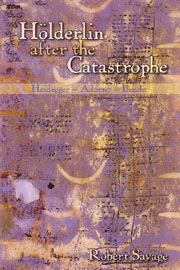Book contents
Introduction: Hölderlin after the Catastrophe
Published online by Cambridge University Press: 05 February 2013
Summary
Was bleibet aber, stiften die Dichter.
(But what remains, the poets found.)
— Hölderlin, “Andenken”Was bleibt geht stiften.
(Whatever's left, go and found.)
— Erich Fried, “Lyrischer Winter”Andenken 1: Souvenir de France
IN NOVEMBER 1946, GÜNTER EICH published his poem “Latrine” in Der Ruf (The Call), a forum established earlier that year for young, disillusioned, and often embittered German writers, many of them returning veterans. The third stanza reads:
Irr mir im Ohre schallen
Verse von Hölderlin.
In schneeiger Reinheit spiegeln
Wolken sich im Urin.
[Mad in my hearing echo
Verses by Hölderlin.
In snowy pureness, mirrored,
Clouds in the urine are seen.]
The poem's narrator thinks of verses by Hölderlin while squatting over a makeshift open-air latrine. Specifically, he thinks of verses from Hölderlin's “Andenken,” for the fourth and final stanza opens with a quotation from that poem:
“Geh aber nun und grüße
die schöne Garonne” —
Unter den schwankenden Füßen
schwimmen die Wolken davon.
[“But go now with a greeting
to the beautiful Garonne” —
Under my tottering feet those
Cloudlets have drifted, are gone.]
Andenken means memento, keepsake, or remembrance, and in the poem of the same name Hölderlin reflects upon his sojourn in Bordeaux, where he had spent a few months in 1801 working as house tutor for a wealthy German family. “Latrine,” too, is set in southern France, where Eich underwent military training in 1940. By citing Hölderlin's line, Eich establishes a brutal contrast between their respective experiences.
- Type
- Chapter
- Information
- Hölderlin after the CatastropheHeidegger - Adorno - Brecht, pp. 1 - 31Publisher: Boydell & BrewerPrint publication year: 2008



